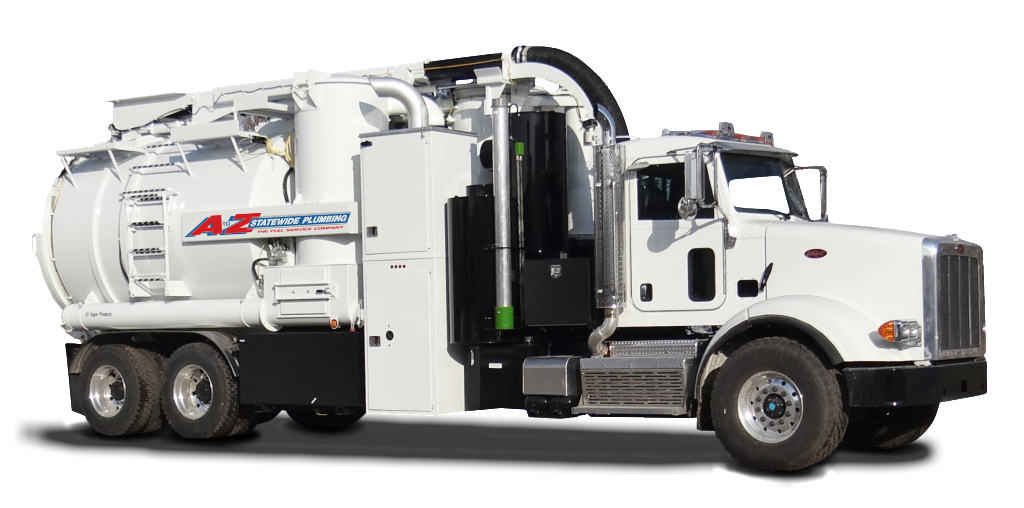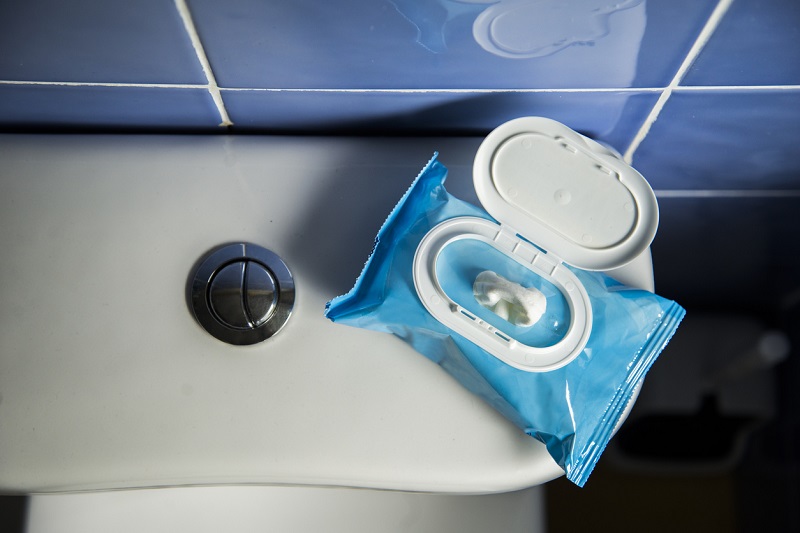Does your shower head produce a gentle drizzle instead of a vigorous driving rain? Do minutes pass when you fill your measuring cup from the kitchen sink faucet? There can be numerous reasons your water pressure is low – and your municipal water utility may not necessarily be the cause! Our team of state-certified master plumbers at Adams and Son Plumbing want you to be knowledgeable about the basic workings of residential plumbing systems, so we’re playing professor this month. Don’t worry – there’s no test at the end! But you will be better able to troubleshoot to determine the cause, and if you need to call a pro.
How does water go through your house?
To understand low water pressure issues, it’s important to know how water goes through your house.
Every building that receives municipal water has a water main of its own. The main line of your house is near the edge of your property. Your home receives pressurized water directly from the pumping station through this line. Typically, there is enough pressure applied to the water so it reaches your home without any problem.
But if your house is too far away from the water station, you might experience some pressure problems in your locality. By the time water reaches your house, the water pressure slows down substantially due to lack of force, and you could face low water pressure. Should this be the case, you can have a pump installed on your main line to provide the extra thrust to the water so that it reaches your home with an adequate amount of pressure.
Once the water reaches your water main, it makes its way into your house through a large pipe, which is ¾ inches or more in diameter. The pipe that carries water to your house from the main line is the water, or supply line. The supply line runs under the foundation of your house, and usually, these pipes are made of plastic, galvanized iron or copper.
The water main line goes to your water heater, but before connecting to the water heater, it branches off into two paths – hot and cold service lines.
After splitting from the main line, the cold service line radiates away from the water heater. All your water appliances receive cold water through cold water service lines. For smooth flow of water, professionals install the pipes in one of these ways – in straight lines, at 90-degree angles, or in a slight downward slope.
Every water appliance has an intake pipe of its own that supplies cold water to all your cold-water outlets. Since you have cold water outlets all over your home, these pipes run throughout your home.
The other part of the water main enters the water heater where it gets heated. From the water heater, the hot water goes to other hot water outlets in your home. Both the hot water service lines and cold water service lines run parallel to each other.
When you open your sink’s faucet, the water from one of the service lines starts flowing from it. All the water outlets in your home that have a hot and cold-water setting have intake pipes connected to the hot and cold-water supply lines. These two intake pipe connections make sure that all your water outlets receive hot and cold water.
Suffering from low water pressure?
As mentioned earlier, most people are quick to blame their water utility, but there are many other reasons for low water pressure. Writing for The Spruce, licensed plumber Aaron Stickley lists common causes for this frustrating situation, and what you need to check.
- The water meter – See if your water meter valve is fully open. If the low water pressure problem is due to this, you can open it completely to resolve the issue.
- The main house shut-off valve – If it is not open completely, do so.
- The pressure regulator or pressure-reducing valve – A defective pressure regulator can also cause low water problems. You need to replace it.
- Old steel pipes – They could be corroding, which causes clogging that slows the flow of water. Replace the pipes.
Things to try to increase the pressure
Also as mentioned earlier, in most cases, low water pressure results from clogged pipes. However, if you’ve had your pipes replaced recently or live in a newer house, there are a few simple remedies you could try.
You can check the shutoff valves and open them completely. You can find out the regular water pressure in your area from your local water utility and check the water pressure yourself. In most cases, the reading should be between 45 psi to 55 psi. A reading below 40 psi indicates a problem. Use a pressure gauge (available at any home improvement center). If you have no confidence in your DIY skills, call a plumber to check it for you.
Family Handyman provides a step-by-step process for checking the pressure and DIY measures to boost low water pressure. We’ve summarized it here, but we recommend reading the article itself.
If your water pressure is less than 40 psi, you need to check the pressure-reducing valve. If you have a pressure-reducing valve on your water main, check its condition. Pressure-reducing valves come preset at 50 psi, but you also have the option to increase or decrease the pressure. You can adjust the screw to increase the water pressure. But if it doesn’t solve your problem, and your pressure-reducing valve is more than 10 to 12 years old, you might have to replace the valve. The average life of a pressure-reducing valve is anywhere between 10 to 20 years. With some basic plumbing knowledge, you can change the valve yourself. If you’re not confident in your ability to do so, call a plumber.
You can use a water pressure booster system to increase the pressure. In order to do this, you should have a ¾ inch (or larger) water main pipe of copper or plastic. The water pressure booster increases the water pressure with the help of an electric pump and a pressure tank. You can adjust the water pressure with a dial on top so that you start getting water at ideal pressure between 45 psi – 55 psi. You need not run the pump every time you open a faucet because the tank in the water pressure booster holds pressurized water, allowing you to get the right pressure. Also, even if you and your family members open more than one faucet at a time, the pressure booster ensures the right pressure in all of your fixtures.
Our master plumbers at Adams and Son Plumbing believe the more you know about basic plumbing care and maintenance, the better you’ll be able to recognize when it’s time to call a professional to prevent even more serious damage and major expense. We’ve proudly served Central Florida homes and businesses with the highest level of quality and experience for over 60 years. We are family-owned and operated, and all of our plumbers are state-certified master plumbers. Contact us to get – and keep – your home’s plumbing in top repair.
The post What to Do If Your Water Flow is Slow appeared first on Adams and Son Plumbing Services.
 The slab leak is a common problem in home plumbing, and unfortunately, it’s one of the most difficult to notice at first. The reason is right in the name: the leaks come from pipes that are buried down in the granite slab foundation of a home. A pipe could leak for months before it begins to show overt signs of what’s happening, and by that point, it will have wasted large amounts of water and inflicted damage to the building.
The slab leak is a common problem in home plumbing, and unfortunately, it’s one of the most difficult to notice at first. The reason is right in the name: the leaks come from pipes that are buried down in the granite slab foundation of a home. A pipe could leak for months before it begins to show overt signs of what’s happening, and by that point, it will have wasted large amounts of water and inflicted damage to the building.



 Sure, you could read the title of this blog post and panic because nobody wants the worst problems possible to be occurring in their furnace. However, we’d like to offer a positive spin on this news as finding out there’s a problem with your furnace and dealing with it might be a better scenario than many homeowners might think.
Sure, you could read the title of this blog post and panic because nobody wants the worst problems possible to be occurring in their furnace. However, we’d like to offer a positive spin on this news as finding out there’s a problem with your furnace and dealing with it might be a better scenario than many homeowners might think. There’s nothing worse than waking up in the middle of the night to a burst pipe or an overflowing toilet. In fact, no plumbing issue, no matter how seemingly small, is fun to deal with. That’s why some plumbing companies (like us) offer emergency plumbing services!
There’s nothing worse than waking up in the middle of the night to a burst pipe or an overflowing toilet. In fact, no plumbing issue, no matter how seemingly small, is fun to deal with. That’s why some plumbing companies (like us) offer emergency plumbing services! You’ve shoveled the last snow, stored the winter gear, and can’t wait to switch your HVAC system from HEAT to COOL. Not so fast! Before turning on the AC for the first day of the cooling season, read about the signs your system needs a tune-up. All HVAC systems let homeowners know it’s time routine
You’ve shoveled the last snow, stored the winter gear, and can’t wait to switch your HVAC system from HEAT to COOL. Not so fast! Before turning on the AC for the first day of the cooling season, read about the signs your system needs a tune-up. All HVAC systems let homeowners know it’s time routine  Last summer, were your cooling bills higher than usual? If you can’t explain the increase with more hot days or prolonged use of the AC, it’s a sign. If you’re like a lot of homeowners, winter crept up, and you go busy. Instead of wondering if you’ll need to budget even more money for cooling this summer, why not schedule your tune-up before the heat hits? If it’s nothing more than a dirty air filter, or some other minor repair, you’ve saved yourself some money and can go on a longer vacation.
Last summer, were your cooling bills higher than usual? If you can’t explain the increase with more hot days or prolonged use of the AC, it’s a sign. If you’re like a lot of homeowners, winter crept up, and you go busy. Instead of wondering if you’ll need to budget even more money for cooling this summer, why not schedule your tune-up before the heat hits? If it’s nothing more than a dirty air filter, or some other minor repair, you’ve saved yourself some money and can go on a longer vacation.